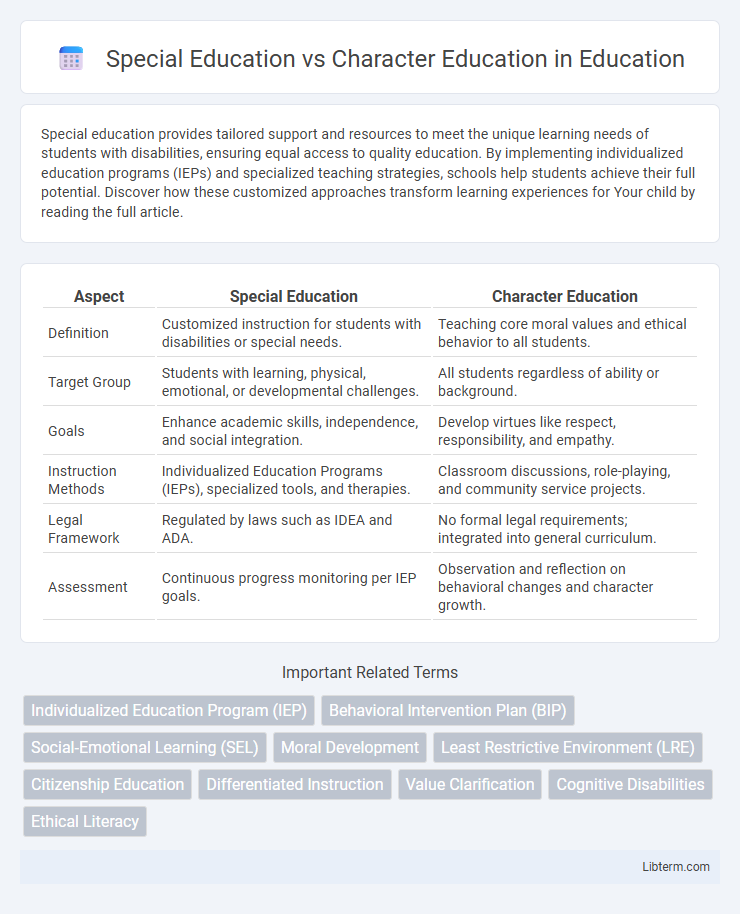Special education provides tailored support and resources to meet the unique learning needs of students with disabilities, ensuring equal access to quality education. By implementing individualized education programs (IEPs) and specialized teaching strategies, schools help students achieve their full potential. Discover how these customized approaches transform learning experiences for Your child by reading the full article.
Table of Comparison
| Aspect | Special Education | Character Education |
|---|---|---|
| Definition | Customized instruction for students with disabilities or special needs. | Teaching core moral values and ethical behavior to all students. |
| Target Group | Students with learning, physical, emotional, or developmental challenges. | All students regardless of ability or background. |
| Goals | Enhance academic skills, independence, and social integration. | Develop virtues like respect, responsibility, and empathy. |
| Instruction Methods | Individualized Education Programs (IEPs), specialized tools, and therapies. | Classroom discussions, role-playing, and community service projects. |
| Legal Framework | Regulated by laws such as IDEA and ADA. | No formal legal requirements; integrated into general curriculum. |
| Assessment | Continuous progress monitoring per IEP goals. | Observation and reflection on behavioral changes and character growth. |
Understanding Special Education: Key Principles
Special education focuses on providing tailored instructional strategies and resources to meet the diverse needs of students with disabilities, ensuring they receive equitable access to learning. Key principles include individualized education programs (IEPs), inclusion, and collaboration between educators, families, and specialists to support cognitive, social, and emotional development. Understanding these principles is essential to creating a supportive environment that promotes academic achievement and personal growth for students with special needs.
Defining Character Education: Core Concepts
Character education centers on cultivating ethical values, social-emotional skills, and responsible behavior through intentional teaching and modeling. Core concepts emphasize integrity, respect, empathy, and citizenship as foundational traits vital for personal development and community engagement. Unlike special education, which addresses individual learning needs, character education aims to foster moral reasoning and character strengths applicable across diverse student populations.
Historical Development: Special vs Character Education
Special education originated in the early 19th century with reformers like Jean-Marc Itard and Edouard Seguin advocating for tailored instruction for individuals with disabilities. Character education traces its roots to ancient philosophical traditions and gained prominence in the early 20th century, emphasizing moral development and citizenship in public schooling. Both fields evolved through distinct historical trajectories reflecting societal shifts: special education responding to inclusion and rights movements, while character education adapted to cultural and ethical debates in curriculum design.
Objectives and Goals: A Comparative Analysis
Special education aims to provide tailored instructional strategies and support to students with disabilities, ensuring equitable access to the curriculum and fostering academic achievement and independence. Character education focuses on developing ethical values, social-emotional skills, and responsible behavior to promote moral growth and positive citizenship among all students. While special education targets individualized learning needs and functional outcomes, character education emphasizes cultivating integrity, empathy, and respect to build a cohesive and respectful school community.
Teaching Methods and Approaches
Special education employs individualized teaching methods such as differentiated instruction, multisensory techniques, and assistive technology to accommodate diverse learning needs and disabilities. Character education utilizes approaches like role-playing, moral reasoning discussions, and positive reinforcement to foster ethical behavior and social-emotional development. Both methods rely on tailored strategies, but special education centers on cognitive and physical challenges, while character education emphasizes values and interpersonal skills.
Curriculum Integration: Differences and Similarities
Special Education and Character Education differ significantly in curriculum integration; Special Education focuses on individualized instructional strategies and accommodations tailored to students with disabilities, while Character Education emphasizes the development of moral and ethical values through explicitly taught lessons across all subjects. Both approaches integrate specialized content into the broader curriculum, aiming to support student growth, with Special Education addressing learning barriers and Character Education fostering social-emotional skills. Effective curriculum integration in both fields requires collaboration among educators to ensure that academic and personal development goals are met simultaneously.
Role of Educators in Each Field
Educators in special education specialize in creating individualized learning plans and employing specialized teaching strategies to support students with diverse learning needs, ensuring accessibility and inclusion. In character education, teachers emphasize modeling ethical behavior, fostering social-emotional skills, and promoting values such as responsibility and empathy to develop students' moral character. Both roles require distinct approaches: special educators focus on accommodating disabilities, while character educators concentrate on shaping students' attitudes and interpersonal skills.
Impact on Student Development
Special education significantly enhances student development by providing tailored instructional strategies and support services that address diverse learning needs, fostering academic growth and social-emotional skills. Character education cultivates essential values like empathy, responsibility, and integrity, shaping students' moral development and positive behavior. Together, these approaches contribute to holistic student development, improving both cognitive abilities and character formation.
Challenges and Controversies
Special education faces challenges related to adequate resource allocation, individualized curriculum design, and ensuring equitable access for students with diverse disabilities. Character education often encounters controversies over cultural biases, differing moral frameworks, and the balance between promoting values and respecting student autonomy. Both fields grapple with policy inconsistencies, varying implementation quality, and debates on the best methods to support holistic student development.
Future Trends in Special and Character Education
Future trends in special education emphasize personalized learning technologies and inclusive classroom models that leverage artificial intelligence to tailor interventions for diverse learners. Character education is evolving towards social-emotional learning frameworks integrated with digital platforms promoting empathy, resilience, and ethical decision-making skills. Both fields increasingly prioritize interdisciplinary approaches and data-driven strategies to enhance student outcomes and address 21st-century educational challenges.
Special Education Infographic

 libterm.com
libterm.com